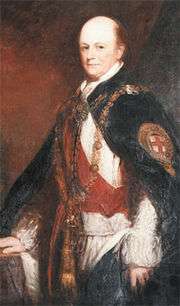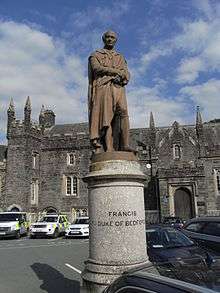Francis Russell, 7th Duke of Bedford
Francis Russell, 7th Duke of Bedford KG PC (13 May 1788 – 14 May 1861), styled Marquess of Tavistock from 1802 to 1839, was a British peer and Whig politician.
The Duke of Bedford | |
|---|---|
 | |
| Tenure | 20 October 1839 – 14 May 1861 |
| Predecessor | John Russell |
| Successor | William Russell |
| Other titles | 7th Marquess of Tavistock 11th Earl of Bedford 11th Baron Russell 9th Baron Russell of Thornhaugh 7th Baron Howland |
| Born | 13 May 1788 |
| Died | 14 May 1861 (aged 73) |
| Spouse(s) | |
| Issue | |
| Parents | John Russell, 6th Duke of Bedford Georgiana Byng |
Background and education
He was the son of John Russell, 6th Duke of Bedford, and his first wife, the Hon. Georgiana Byng, second daughter of George Byng, 4th Viscount Torrington.[1] Russell was educated at Westminster School and graduated from Trinity College, Cambridge in 1808 as a Master of Arts.[2] He succeeded his father as duke in 1839.

Career
He entered the British House of Commons in 1809, sitting as Member of Parliament for Peterborough in the next three years. Subsequently, Russell represented Bedfordshire until 1832. In the following year, he was summoned to the House of Lords in his father's junior title Baron Howland of Streatham by a writ of acceleration.[1] Russell was sworn of the Privy Council on 6 July 1846 and was invested as a Knight of the Order of the Garter on 26 March 1847. He was made a Special Deputy Warden of the Stannaries in 1852[1] and was appointed Lord Lieutenant of Bedfordshire in 1859, a post he held until his death in 1861.
Family

Russell was the elder brother of John Russell, 1st Earl Russell, who was twice Prime Minister of Britain.
On 8 August 1808, he married the Hon. Anna Maria Stanhope, daughter of Charles Stanhope, 3rd Earl of Harrington, and had by her a son.
Russell died in 1861, aged 73, and was buried on 22 May at the ‘Bedford Chapel’ of St. Michael's Church at Chenies, Buckinghamshire. He was succeeded in his titles by his only son William.
References
- Dod, Robert P. (1860). The Peerage, Baronetage and Knightage of Great Britain and Ireland. London: Whitaker and Co. p. 111.
- "Russell, Francis, Marquess of Tavistock (RSL807F)". A Cambridge Alumni Database. University of Cambridge.
External links
- Hansard 1803–2005: contributions in Parliament by the Duke of Bedford
| Parliament of the United Kingdom | ||
|---|---|---|
| Preceded by French Laurence William Elliot |
Member of Parliament for Peterborough 1809 – 1812 With: William Elliot |
Succeeded by William Elliot George Ponsonby |
| Preceded by Francis Pym Hon. Richard FitzPatrick |
Member of Parliament for Bedfordshire 1812 – 1832 With: Francis Pym 1812–1818, 1820–1826 Sir John Osborn, Bt 1818–1820 Thomas Potter MacQueen 1826–1830 William Stuart 1830–1831 Sir Peter Payne 1831–1832 |
Succeeded by Lord Charles Russell William Stuart |
| Honorary titles | ||
| Preceded by The Earl de Grey |
Lord Lieutenant of Bedfordshire 1859–1861 |
Succeeded by The Earl Cowper |
| Peerage of England | ||
| Preceded by John Russell |
Duke of Bedford 1839–1861 |
Succeeded by William Russell |
| Baron Howland of Streatham (writ of acceleration) 1833–1861 | ||